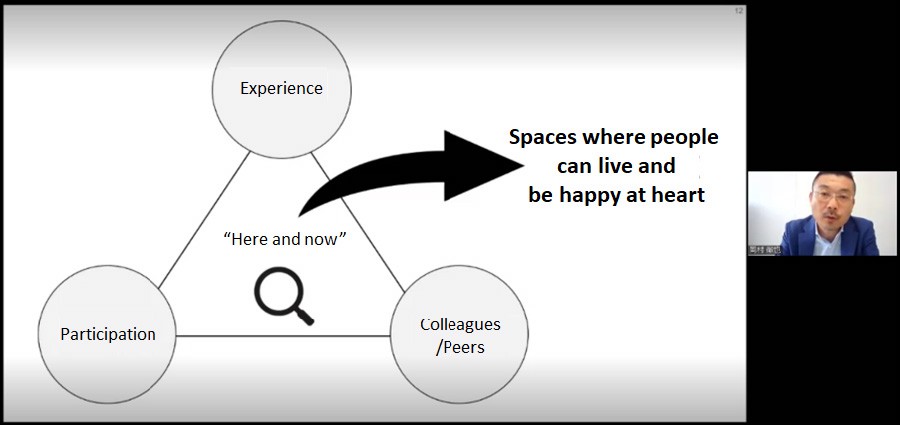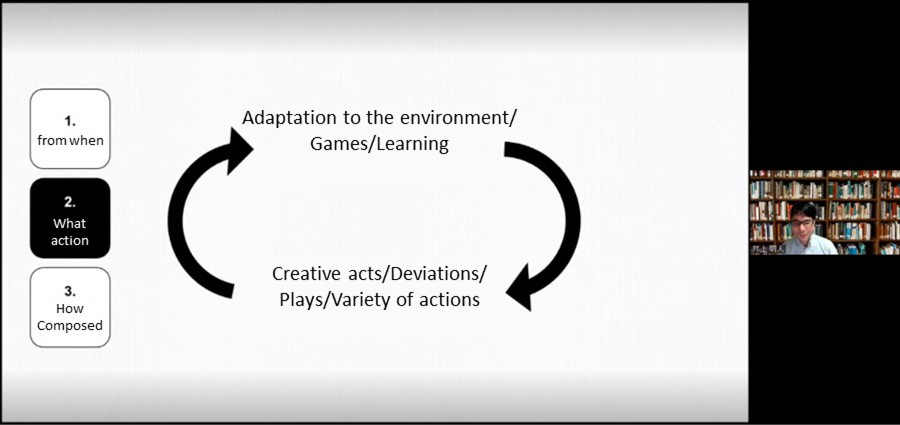Apr. 14, 2023
Well-being as Seen from "Play" and "Space"Report vol. 2: The Emotional Well-Being Workshop
Everyone can live happy and authentic lives. To help make this possible in the future, Toyota Motor Corporation has defined its mission as "Producing Happiness for All" and is challenging itself to create a better mobility society and community as a mobility company, in addition to car manufacturing. To take this challenge one step further, researchers from Toyota Motor Corporation's Frontier Research Center (Toyota), Toyota Central R&D Labs., Inc. (TCRDL), and Toyota Research Institute (TRI) launched the "Emotional Well-Being Workshop" in 2021. In this study group, we discuss "What is Happiness? and "What is Well-Being?" The group discusses well-being from various angles through dialogues with experts from various fields. We hope to share the discussion not only with the Toyota Group, but also with many more people, so that we can create an opportunity to think about what we can do for the well-being of people in the society of the future.
[English Translation]
Left: The first The Emotional Well-Being Workshop, "Well-Being from the Perspective of Diversity and Pluralism", 10:00-12:00, March 18, 2022
Right: The 1st presentation "Well-Being from the View of Diversity of Life" by Prof. Kunihiro Ohta, Executive Director and Vice President of the University of Tokyo
The 2nd presentation "What is a Community with Diversity and Pluralism?―Clinical Psychology Perspective" by Prof. Miho Takahashi, the University of Tokyo's Graduate School of Education
A panel discussion with Prof. Ohta, Prof. Takahashi, Mr. Koga, CEO of TCRDL and Dr. Pratt, CEO of TRI
The first meeting, titled "Well-Being from the Perspective of Diversity and Pluralism," discussed Well-Being from the perspectives of biology and clinical psychology. The diversity of well-being for each individual leads to well-being as a group. We realized that it is important to care for each other because of our diversity.
Are we able to realize what well-being is for someone other than ourselves, whether that person has well-being, and whether things are not going well for them? This question led to the second workshop, where we considered if it is important to well-being to have the space to be mindful of someone other than oneself and to accept the other's feelings.
The Theme of the 2nd Workshop was "Play" and "Space"
[English Translation]
The 1st presentation "Toward Producing Well-Being Spaces" by Mr. Okamura
The 2nd presentation "Can't We Make the World Full of Play?" by Prof. Inoue
A panel discussion with Mr. Okamura, Prof. Inoue, Dr. Kojima and Dr. Kawamura
Playing games, walking in a field, and playing are pleasures that help refresh the body and mind, but too much enthusiasm may lead to the depletion of one's space and increase stress. This is why we held the second workshop on the theme of "Well-Being as Seen from the Perspective of Space," with the viewpoint that both of the meanings of "play"―the literal meaning and the meaning in engineering which refers to extra room or space―may be important for people's well-being. We had two speakers, Mr. Tetsuya Okamura, who is a board member of the Association of International Marathons and Distance Races and teaches sociology at Chukyo University, and Dr. Akito Inoue, who conducts research on games at Ritsumeikan University. Afterwards, Dr. Kojima, Director of TCRDL, and Dr. Kawamura, Unit Leader of Toyota, joined us for a panel discussion. The following is a description of the workshop.
Each of Us is a Producer of "Well-Being Spaces"
Mr. Okamura spoke on "Toward Producing Well-Being Spaces," starting with the knowledge he has gained mainly through developing businesses and events on what perspectives he will use to create and accomplish well-being spaces.
In creating events such as marathons, Mr. Okamura emphasizes the importance of keywords such as "experience," "participation," and "colleagues or peers" that can only be had at a particular place and with particular people who grow through the project. When practicing each of these keywords, he pays attention to the "here and now." This allows him to feel what he calls "life" and focus on a moment that is "heart-pleasing." He pointed out that creating a "space where people can live and be happy at heart" is important and can even improve creativity and imagination.
He pointed out that a well-being space must not be completed by the designers' efforts. In sociology, there is the idea that the way a space exists changes depending on the way people interact with it. Based on the premise that the space itself is open and transformable (with "play" or space), it is important to remember that it is not only a matter of receiving the space provided, but also the desire to actively transform it by the participants in it.
In an ever-changing society, new difficulties and stressful situations arise. Mr. Okamura explains that the ability to challenge and overcome these various difficulties, such as by using creativity and imagination, is important in creating well-being spaces, and then he concluded his speech by reminding us that each of us is a producer of "well-being spaces."
Can't We Make the World Full of Play?
Prof. Inoue, a game researcher and game creator himself, began his talk with a historical background on the relationship between playing, games, and society. This is a theme that has been considered since ancient times BCE, with some aspects of play being viewed as not good. So, are fun and work of two different natures? Prof. Inoue explained that play is a concept that is continuous with learning, for example, hunters learn how to live through play. On the other hand, he pointed out that in modern society, the position of play fluctuates and is easily varied by society, for example, learning is separated into certain areas. Using sports as an example, he also mentioned that there is the enjoyment of taking things seriously and the enjoyment of taking things less seriously and doing them for relaxation, and that's why there are variations in the way we approach the act of playing.
What kind of playing makes us addicted? Prof. Inoue explained that "adaptation to the environment" and "creative acts and deviations" are cycled through play to get us hooked. When making a game, developing a variety of sequential acts is the foundation, as many video games are designed in stages so that they can be mastered step by step.
In gamification, which incorporates game elements into daily life, there have been an increasing number of attempts to convert metrics of daily life into play, such as the recent excitement over an application that achieves high energy savings by keeping track of electricity meters, or the worldwide popularity of a video showing a simple walk in the COVID-19 pandemic. The spread of information technology has made it easier to quantify everyday life, and this quantification has facilitated the fusion of everyday life and play.
Play is a Cradle Fostering Well-being
-

- Upper row: Prof. Inoue (left), Mr. Okamura (center), Dr. Kojima (right)
Lower row: Dr. Yamaguchi, Toyota (left, facilitator), Dr. Kawamura (right)
At the beginning of the panel discussion, Dr. Kojima, the director in charge of advanced research at the TCRDL, commented that she was encouraged by Mr. Okamura's words that new discoveries cannot be made by only doing what is popular at events, and that one must do something new to move on. Mr. Okamura said that play is an important part of human life, and that in the corporate world, "play" (not only as a game but also as a cushion to prevent friction) is a cradle fostering well-being. In response, Dr. Inoue introduced a phrase from architect Jun Aoki's book, "a field and an amusement park." He said that when designing a game for many people to enjoy, the points of enjoyment should be designed like an "amusement park." On the other hand, the "well-being space" that Mr. Okamura spoke of can be interpreted as a "field" that can be used in any way, and as a cradle that nurtures diversity, which is an important point of view.
Dr. Kawamura, Unit Leader in charge of basic research at the Toyota, asked how the diversification of values affect gamification. In response, Dr. Inoue stated that the key point of gamification is to add various kinds of value to real spaces, together with the users, and as a result, the users' views of the real space will change. This is connected to Mr. Okamura's statement that each of us is a producer of "well-being spaces." In addition, He pointed out that, although there is a usage that the designer of the space does not expect, it is important for the designer to allow this and take advantage of this.
Toward the Next Workshop
In response to the theme of "Play and Space," Mr. Okamura and Dr. Inoue engaged in a wide-ranging discussion on Well-Being from the viewpoints of events and games, respectively. Events and games that can be enjoyed by many people have a space in which a diverse range of customers can be actively involved, and by using their creativity and imagination to overcome the difficulties that arise, the events and games become more interesting, and the people who participate in them will come to have more well-being. Here we can see the common structure of the event and games, and this led to one keyword emerging: "Play is a cradle fostering well-being and diversity."
As we continue these discussions with many experts, we would like to consider what Toyota can do for the well-being of people living in the society of today and tomorrow. Please look forward to the continued activities of the Emotional Well-Being Workshop.
Contact Information (about this article)
- Frontier Research Center
- xr-probot@mail.toyota.co.jp










